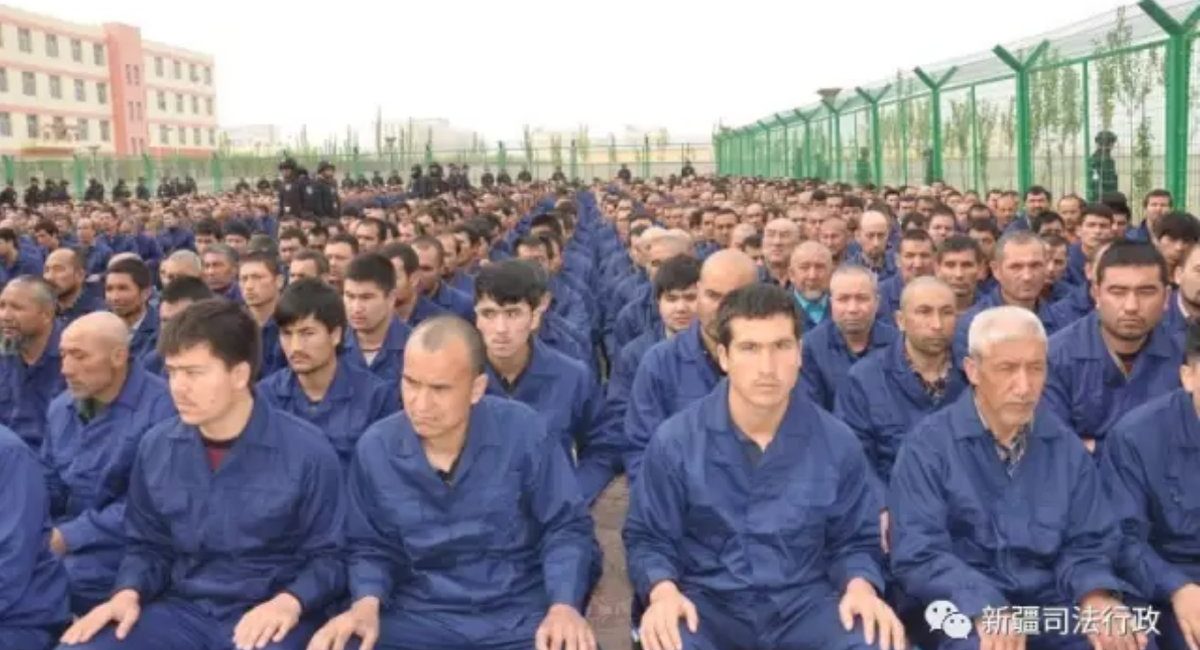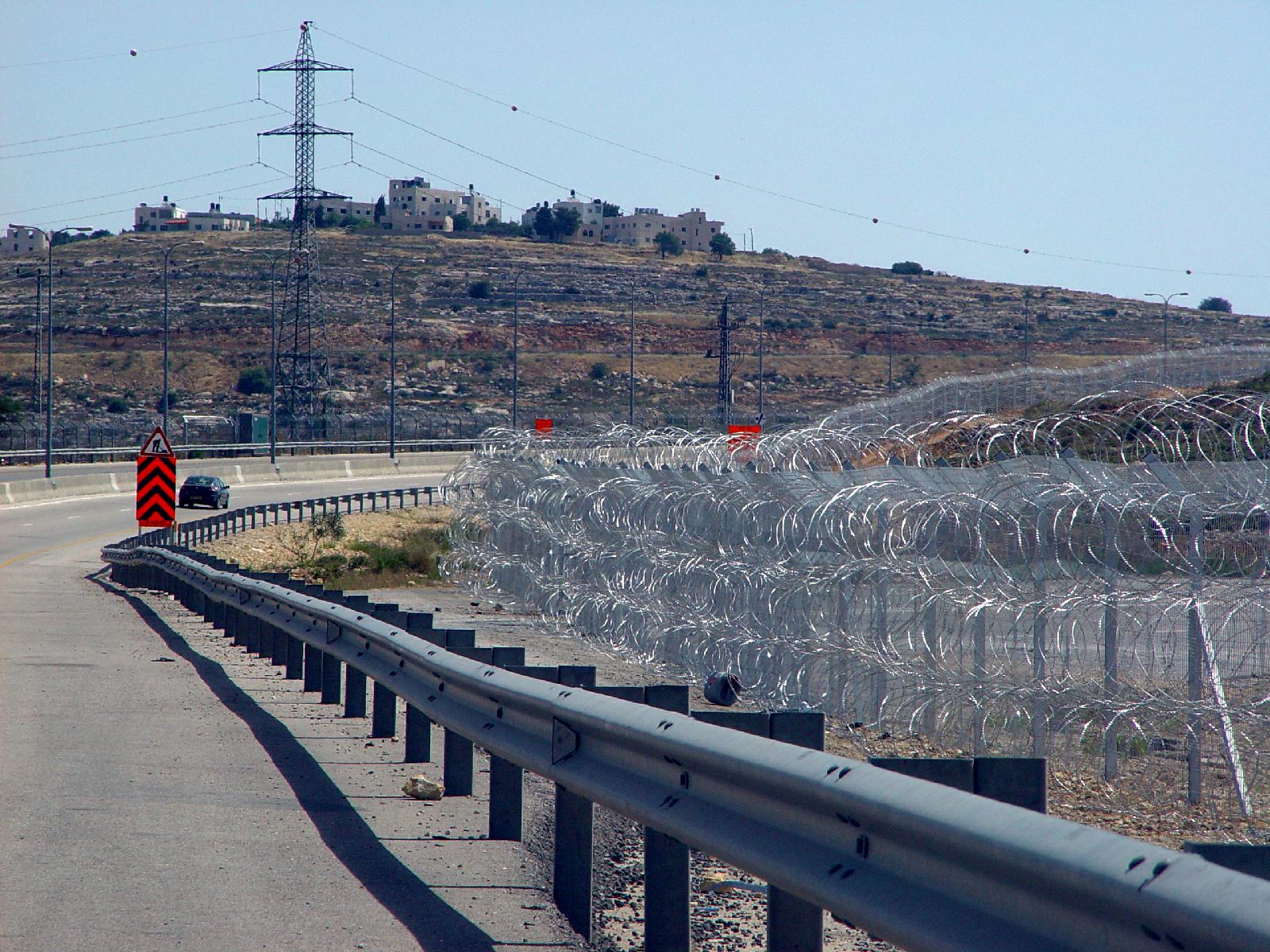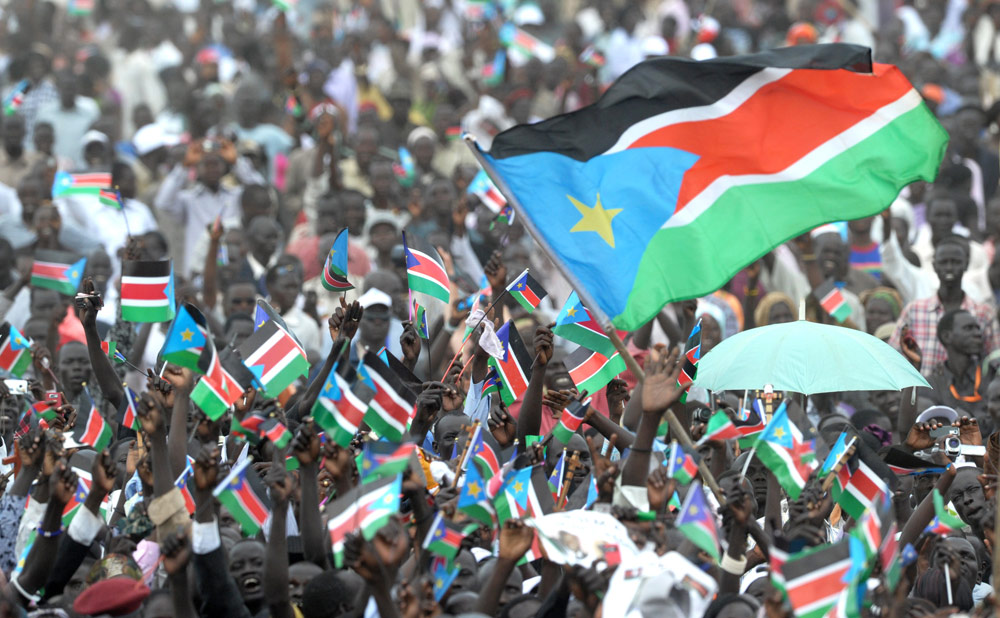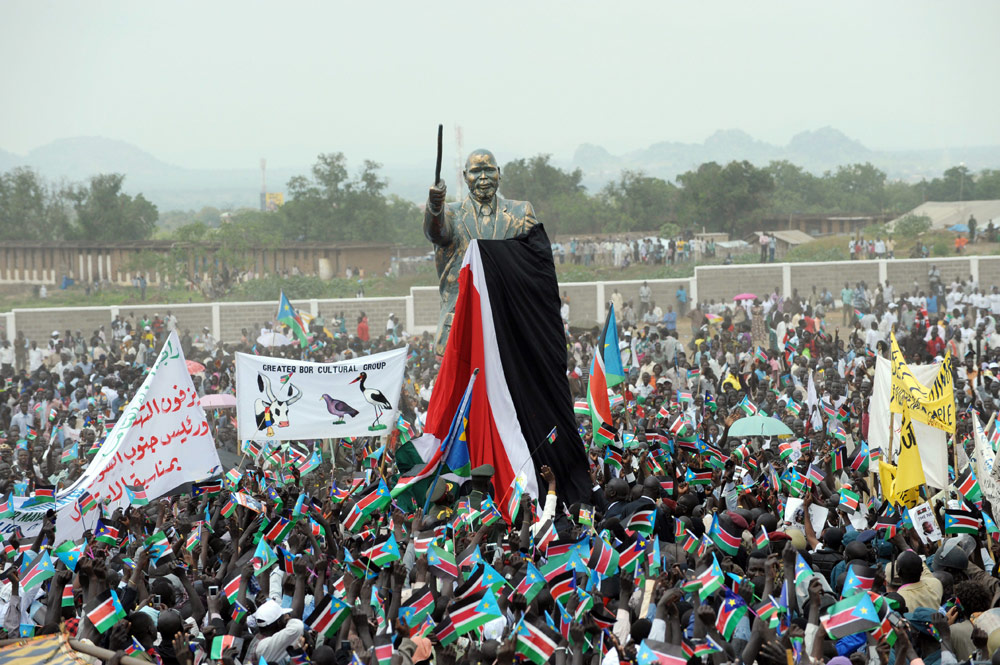21. THE TROUBLED 21st CENTURY


ISSUES ELSEWHERE
 Japan has its own problems
Japan has its own problems
 Growing North Korean ambitions
Growing North Korean ambitions
 China's problems with Muslim Uighur
China's problems with Muslim Uighur
resistance in Xinjiang
 India taking on the character of a world
India taking on the character of a world
power
 The ongoing conflict between Israel and
The ongoing conflict between Israel and
Palestine
 The continuing development of the
The continuing development of the
European Union
 But deep changes in the West's
But deep changes in the West's
economic structure
 The British vote to leave the EU
The British vote to leave the EU
("Brexit") – June 2016
The textual material on page below is drawn directly from my work
A Moral History of Western Society © 2024, Volume Two, pages 377-386.
JAPAN HAS ITS OWN PROBLEMS |
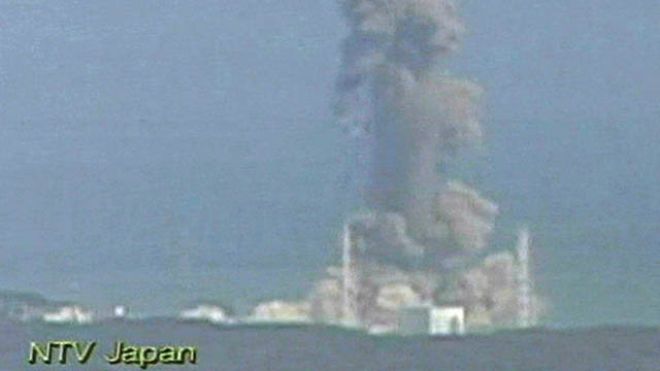
Smoke ascends from the
Fukushima
Dai-ichi nuclear plant's Unit 3 in Okumamachi, Fukushima
Prefecture, northern Japan - March 14.
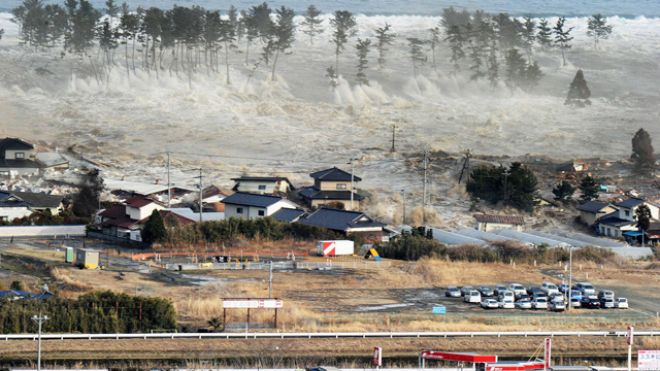
Waves of tsunami hit residences after a powerful earthquake in Natori, Miyagi prefecture - March 11, 2011
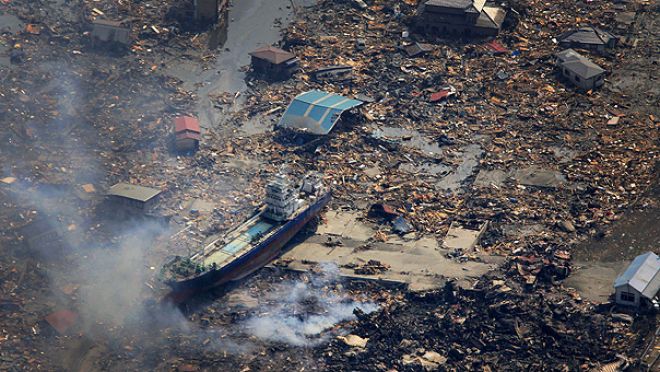
A ship washed away by tsunami
sits amid debris in Kesennuma, Miyagi prefecture after Japan's biggest recorded
earthquake hit its eastern coast - March 13, 2011
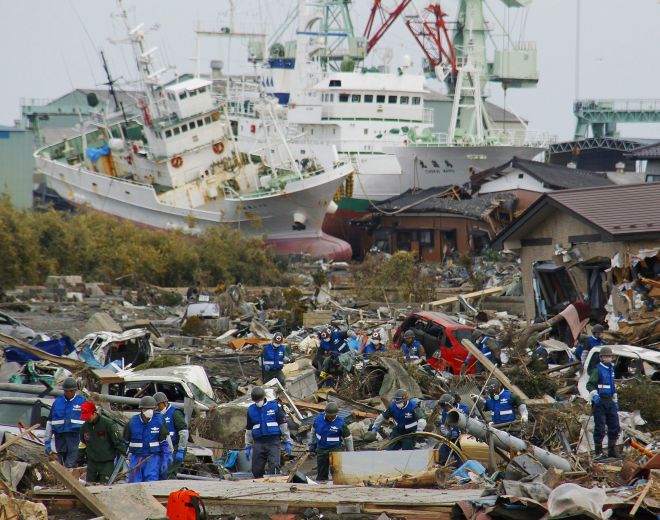
Soldiers of Japan Self-Defense
Force and firefighters search for the victims in the rubbles
in Matsushima, Miyagi Prefecture, Japan - March 14
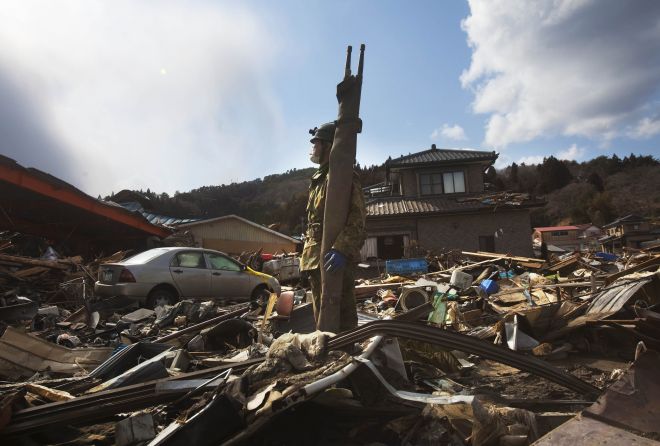
A Japanese soldier holds
a stretcher as his fellow military members search for victims in the tsunami and earthquake
ravaged city of Kesennuma, northeastern Japan -
March 27, 2011
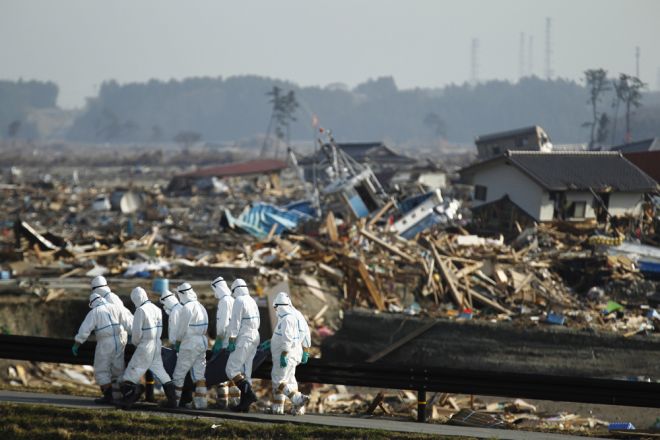
GROWING NORTH KOREAN AMBITIONS |
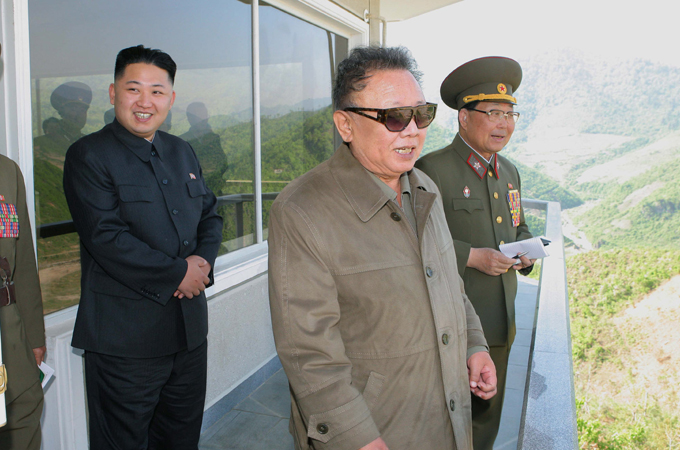
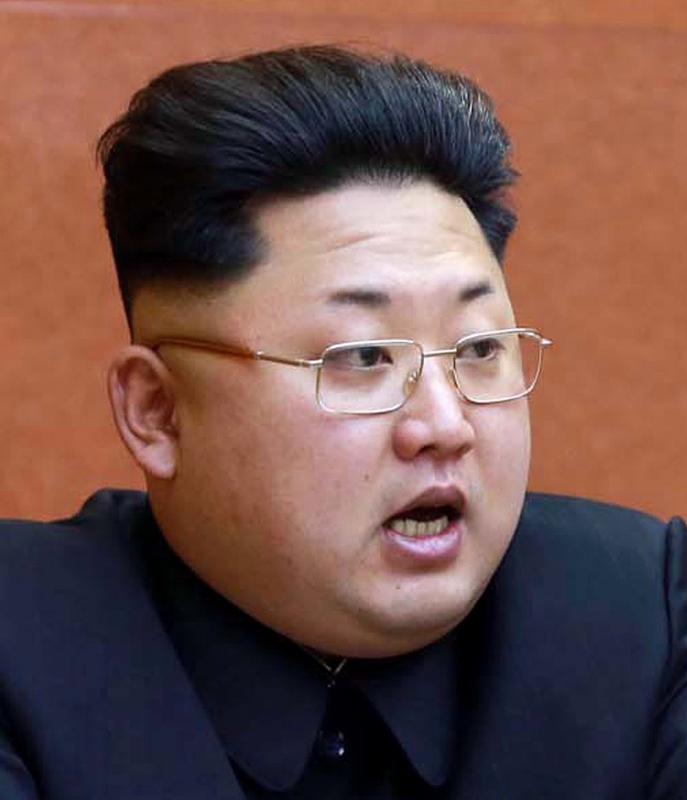
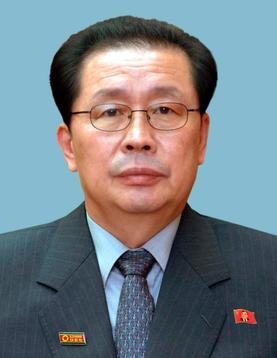
Jang Song Thaek
| Kim Jong-il, North Korean dictator for 19 years, died on December 17, 2011. His heir-apparent was his son Kim Jong-Un, although Kim Jong Un’s uncle, Jang Song Thaek (brother-in-law and long-time advisor of Jong-il's) was expected to run the country until the young Kim Jong-un developed the ability to run the country in the manner of his father and grandfather Kim Il Song (the founder of the Kim dictatorship). Actually, that did not take long. In December of 2013 Jang was accused of being a "counter-revolutionary" and soon executed ... along with members of his family. |
The rise to power of Kim Jong-un has only made North Korea more belligerent
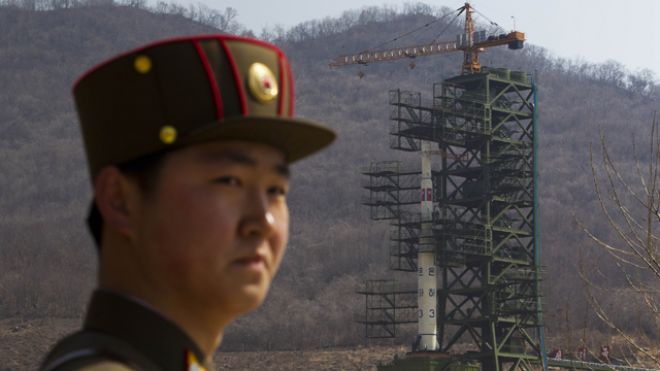
THE
CHINESE ALSO HAVE THEIR OWN PROBLEMS WITH MUSLIM UIGHUR RESISTANCE IN XINJIANG |
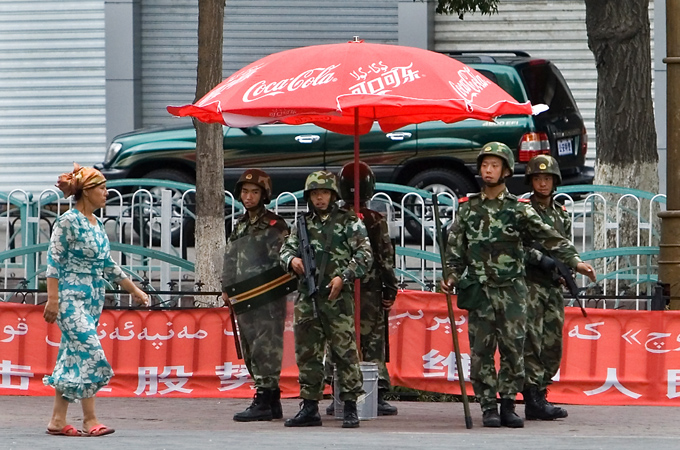
China's policies towards
the Uyghurs in Xinjiang may jeopardize its New Silk Road dream. Today, Uyghurs have become
a minority in Xinjiang province,
comprising now only 41 per cent of the population
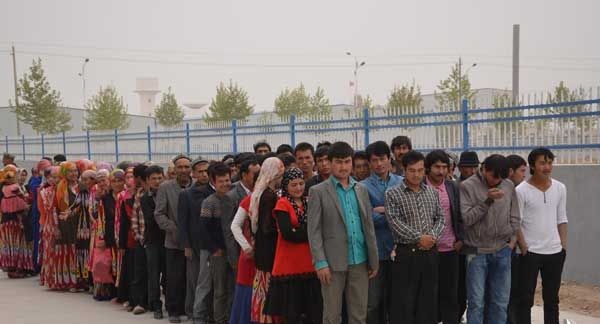
Uyghurs being rounded up for deportation to a Chinese prison camp
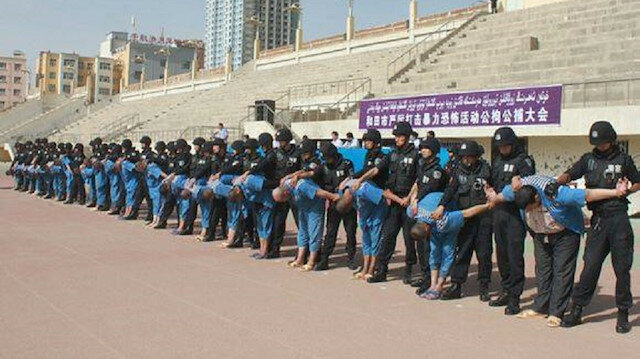
INDIA TAKING ON THE CHARACTER OF A WORLD POWER |
| In September of 2006, foreign ministers of Brazil, Russia, India, and China met during a UN conference to
look into the matter of closer economic cooperation ... some kind of
economic union that they could work out among themselves - one that
allowed them to develop economically apart from the world's
dollar-dominated financial system. In mid-June of 2009 the leaders of the four countries would meet in Ykaterinburg, Russia, to formalize their new financial union ... with South Africa then joining the next year to make the group a "fivesome" or BRICS! |
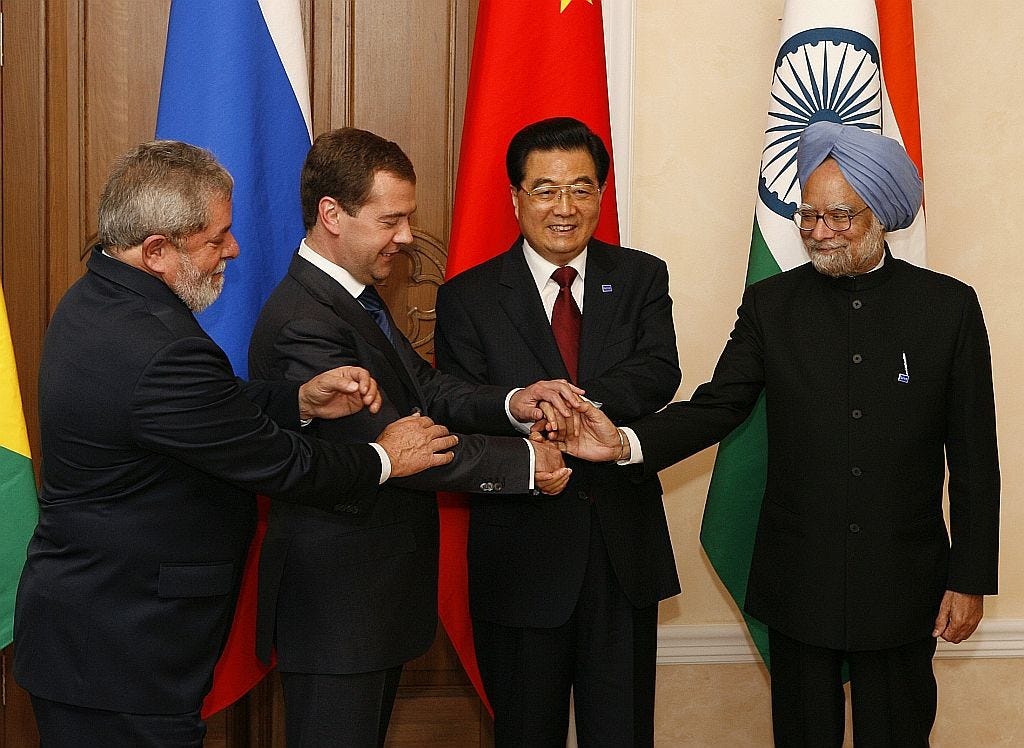
Indian Prime Minister Manmohan Singh attending the first summit meeting of the BRICS group and Chinese President Hu Jintao in Yekaterinburg Russia in mid-June of 2009
PAKISTANI DOMESTIC TENSIONS |
|
Pakistan's economic center, the
city of Karachi (16 million people providing 68% of the country's tax revenue),
is a city bitterly torn by sectarian strife, a combination of hostile ethnic
sub-communities and related political parties which exploit these hostilities
in order to advance their fortunes (as they see things).
The most notable of such groups is the Muttahida Qaumi Movement (MQM) – made up heavily of Mohajirs, Urdu-speaking Muslim migrants from India in 1947 when both countries were granted independence by Britain. The MQM dominates Karachi politics, holding 17 of Karachi's 19 seats in the National Assembly. The MQM is an political ally of the Pakistan People's Party (PPP), long dominant in Pakistan's politics (the PPP's power base tends to be in rural central and southern part of Pakistan). Both the MQM and the PPP work with the coalition forces (importantly the United States) who move vast amounts of military supplies through Pakistan to supply their troops fighting the Taliban in Afghanistan. Bitterly opposing these two parties and their pro-Western policies is the Awami National Party (ANP), heavily Pashtun – a large ethnic group of perhaps 3.5 million living in Karachi drawn from the lands on a both sides of Pakistan's northern border with Afghanistan). The ANP is heavily supportive of the Taliban, both in Afghanistan but also operating widely in the northern frontier provinces of Pakistan. It is important to note also that though the country is 96 per cent Muslim, two-thirds are Sunni Muslim and the rest mostly Shia Muslim – two Muslim religious sub-communities whose hatred for each other is deep and ancient. This strongly affects Pakistan's ambiguous relations with heavily Shi'ite Iran, Pakistan's western neighbor. Local branches of the nation's main political parties have long used street gangs to bully their opponents and get their own voters out to the polls on election day. This contributes greatly to the spirit of violence that runs through Pakistani politics. |
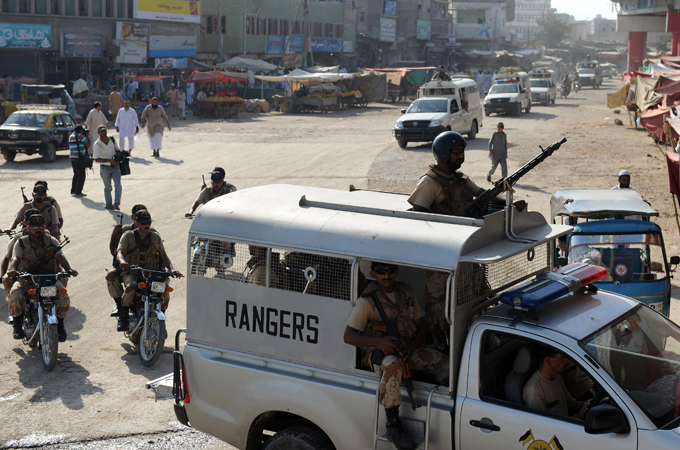 Karachi, Pakistan's largest
city, has a long history of political, ethnic, and sectarian violence.
Karachi, Pakistan's largest
city, has a long history of political, ethnic, and sectarian violence.
THE ONGOING CONFLICT BETWEEN ISRAEL AND PALESTINE |
Palestinians are still frustrated by Israel's unwillingness to allow them a real "state" (Israel obviously intending to take over all of Palestine for Israeli purposes)
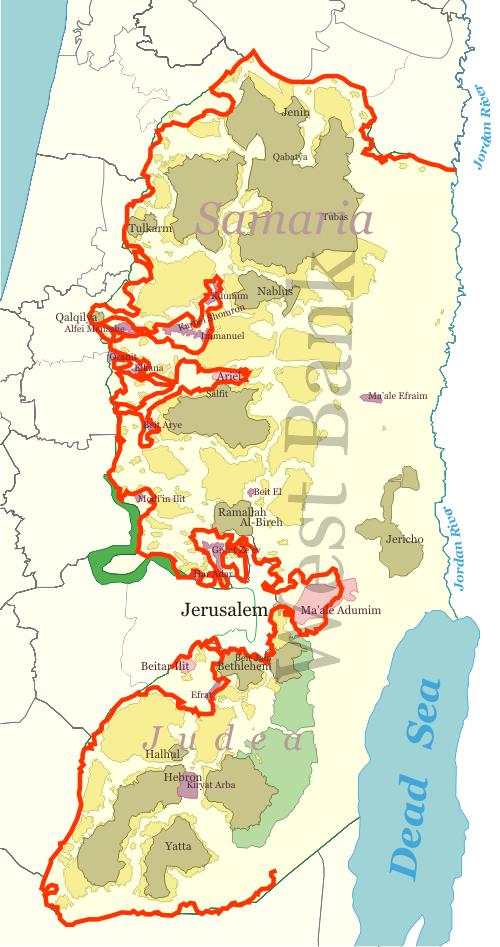
in check – and to protect new Jewish settlements in the West Bank region (the green line indicates the UN mandated border, largely ignored by Israel)
Wikipedia, "Israeli West Bank barrier"
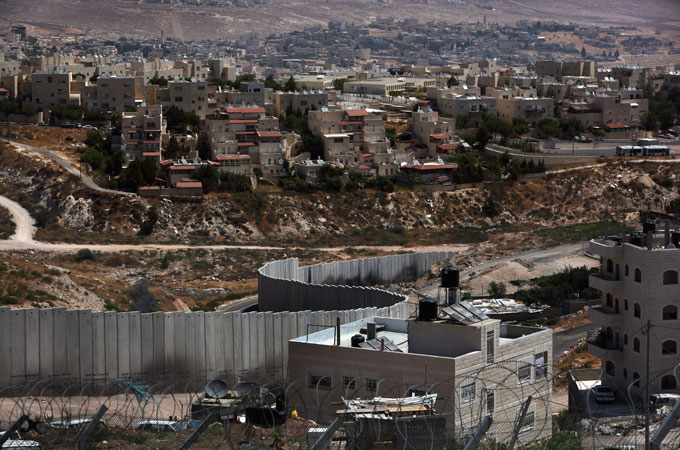
Route 443 near Giv'at Ze'ev Junction, with pyramid-shaped stacks of barbed wire forming a section of the Israeli West Bank barrier
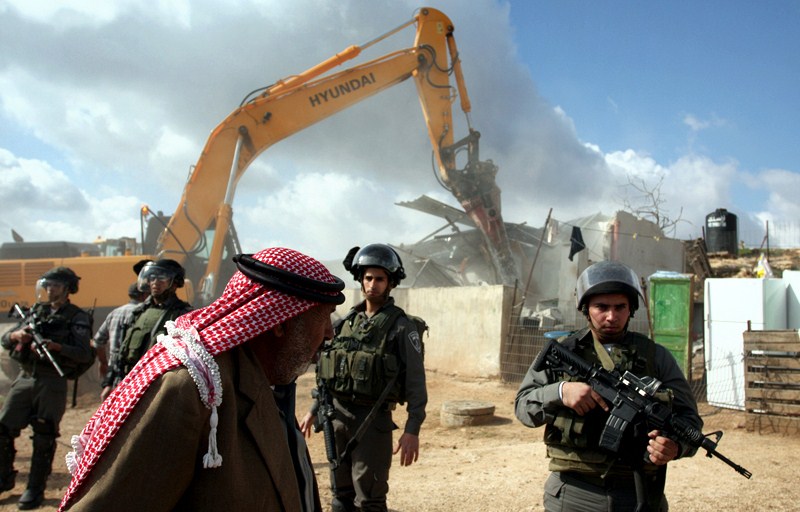
Israelis destroying a Bedouin settlement near Jerusalem
But Israel too went through something similar to the Arab Spring in 2011
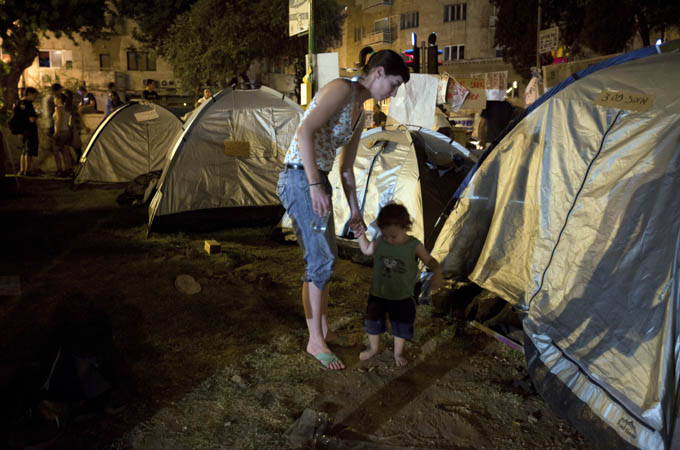
Israelis suffering from high
costs of living have moved into tents as a form of protest
- August 2011. Rapid increases in the cost
of living bring more than 150,000 Israelis
on to the streets of six
cities
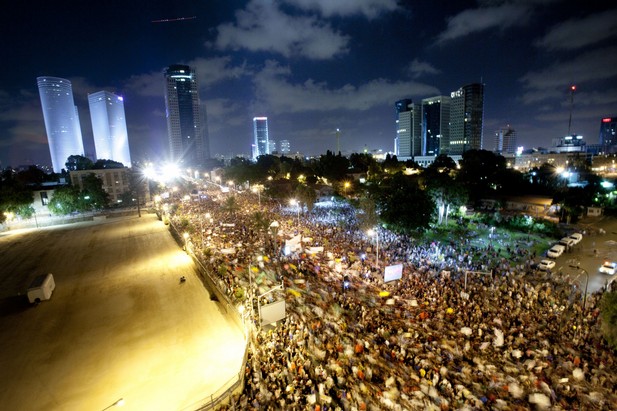
Several hundred thousand
people march in the streets during a protest against the rising
cost of
living in Tel Aviv, Israel.
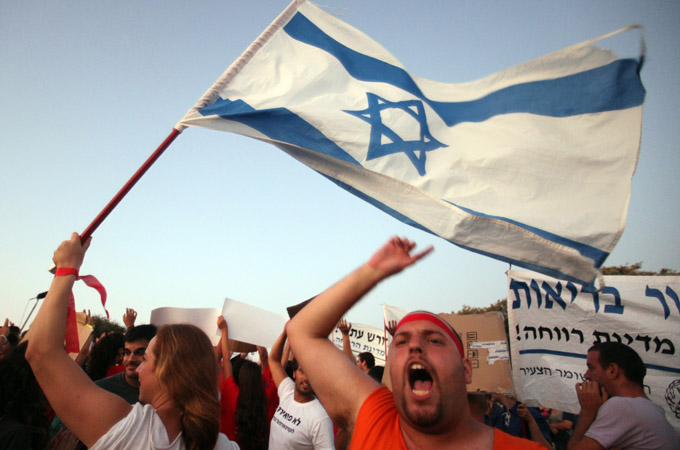 The hundreds of thousands
of protesters in Israel hope to achieve what can only be described
as a socio-economic revolution. Protests in Israel
vaguely resembled the protests that had sparked the Arab Spring.
The hundreds of thousands
of protesters in Israel hope to achieve what can only be described
as a socio-economic revolution. Protests in Israel
vaguely resembled the protests that had sparked the Arab Spring.
A BROKEN AFRICA |
Desperation throughout the Starving Sahel
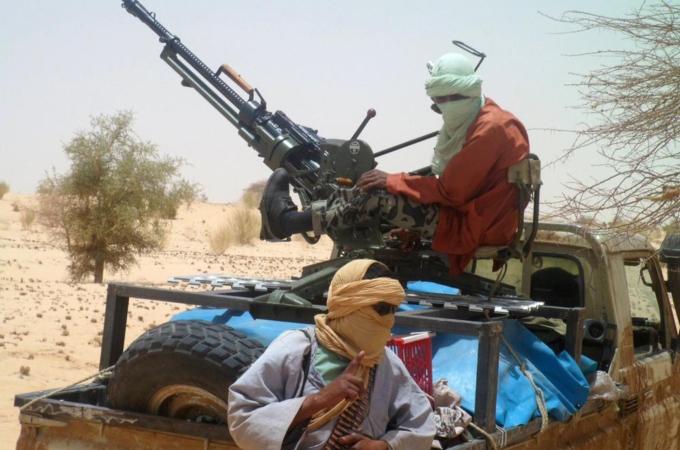
AFP
"The militarisation of poverty in Africa,"Al Jazeera - May 29, 2012
|
Famine in the Horn of Africa (most Somalia) The Horn of Africa (Djibouti and Somalia and parts of Ethiopia and Kenya) is experiencing the worst drought in 60 years. The situation is made worse by wars conducted by various military parties (the US deals with some 20 such "sub-groups") in Somalia, the most notorious being al-Shabab (an al-Qaeda affiliate), which has blocked UN food shipments to Somalia. Approximately a quarter of the Somali population has been displaced by the drought and famine. |
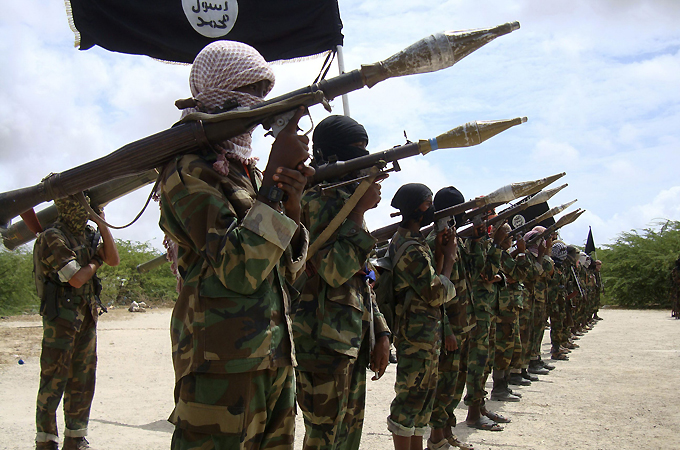
Al-Shabab fighters parade
new recruits after arriving in Mogadishu, the Somali capital,
in October
2010. First such US drone attack reported
in East African nation
wounds two leaders of anti-government group
al-Shabab. Al Shabab seeks
to institute a Sharia-based Islamic law system in Somalia.
Al Jazeera - "US
'extends drone strikes to Somalia'" - 1 July 2011
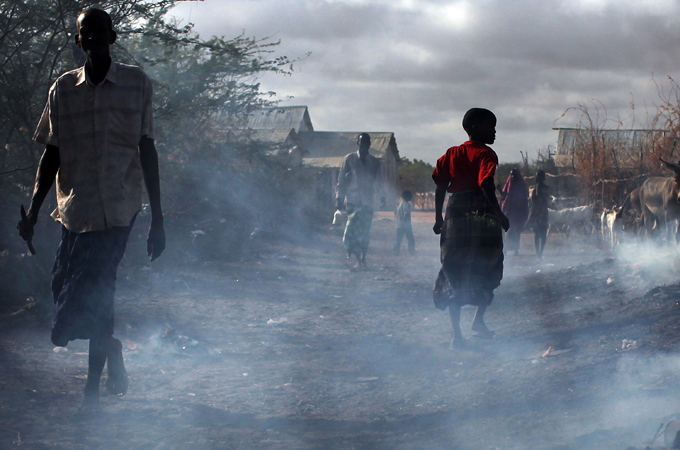 Warlords and extremist groups
have taken over Somalia in the absence of real progress towards
statebuilding. The US approach to
statebuilding
has inadvertantly led
to more clan divisions, but youth groups are pressing
for unity.
Warlords and extremist groups
have taken over Somalia in the absence of real progress towards
statebuilding. The US approach to
statebuilding
has inadvertantly led
to more clan divisions, but youth groups are pressing
for unity.
Al Jazeera - "Dual track policy in Somalia misses the point" - 1 July 2011
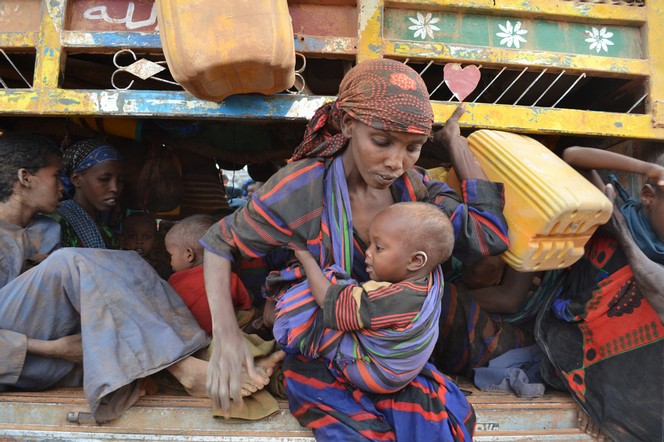
The rundown border town of
Dobley is the last stop in Somalia for refugees fleeing
across the border
to Kenya.
Al Jazeera - "Somalia
to Dadaab: The journey from hell" - 14 July 2011
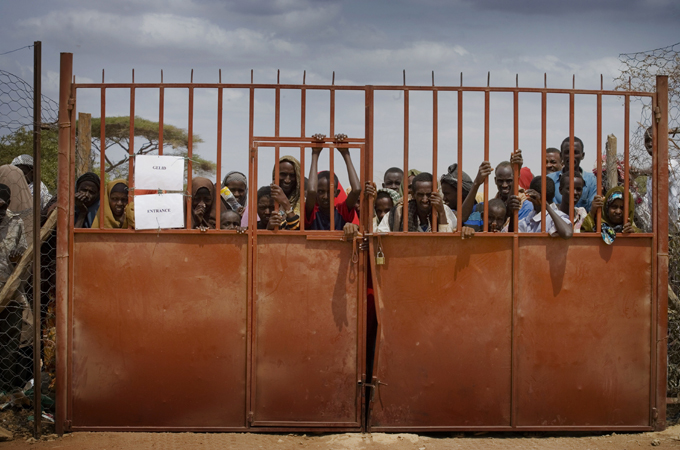
Newly arrived Somali refugees
waiting to be registered at Dagahaley camp, Dadaab in Kenya.
Al Jazeera - "Kenya
to open new camp on Somali border" - 14 July 2011
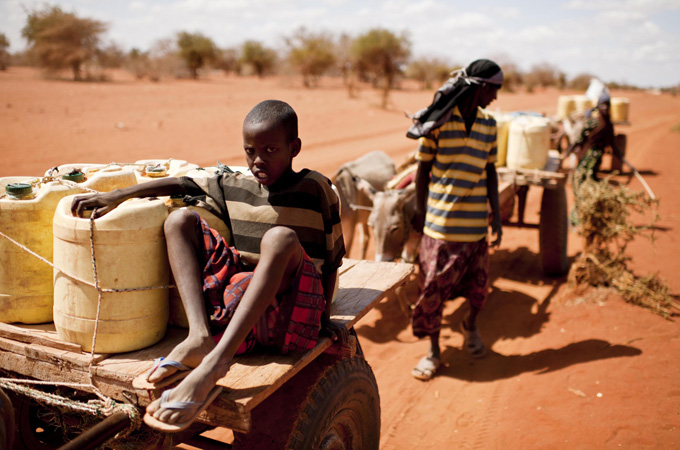
The worst drought in 60 years
plagues the Horn of Africa - affecting 12 million people.
Al Jazeera - "Somalia
to Dadaab: The journey from hell" - 25 July 2011
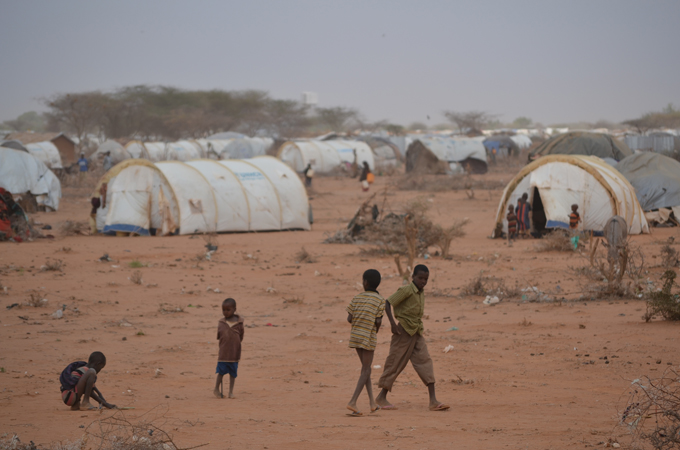
Desperation reigns amid the
380,000 refugees in Dadaab, a sprawling "tent city"
in northeastern Kenya.
Al Jazeera - "Dadaab,
the world's biggest refugee camp" - 11 July 2011
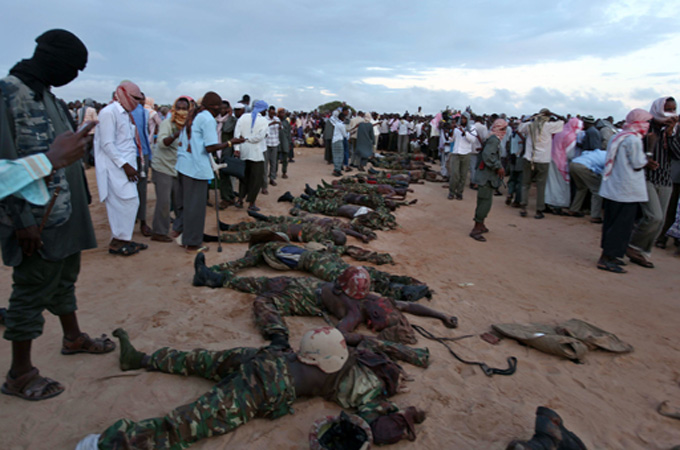
Somali anti-government fighters
display what they say are bodies of more than 70
Burundian soldiers killed
in battle. The African Union peacekeepers'
bodies were
put on display in the al-Shabab-controlled El-Maan area, 18km
from Mogadishu
Al Jazeera - "Al-Shabab
claims peacekeepers' killings" - October 21, 2011
A new country is born when South Sudan separates from the Sudan - July 9, 2011
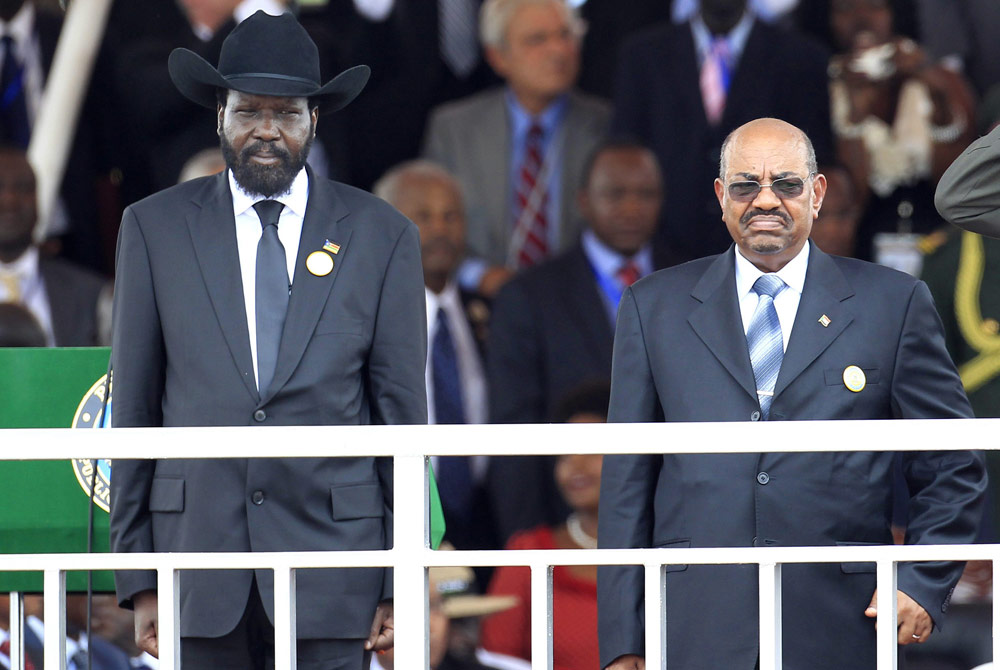
South Sudan's president Salva
Kiir (L) and Sudan's president Omar Hassan al-Bashir attend the Independence
Day ceremony in Juba. Addressing the crowd, Kiir said: "We should have
a new beginning of tolerance where cultural and ethnic diversity will be
a source of pride ... Remember we are all South Sudanese first"
Al Jazeera
"We are free," Helen Joseph
, a young woman standing in the crowd next to her mother, told Al Jazeera.
"We have only known war. Now we can know peace"
Al Jazeera
A large crowd waves the new
South Sudan flag during the unveiling of a statue of late South Sudan rebel leader
John Garang during a ceremony celebrating independence
Al
Jazeera
LATIN AMERICAN CHALLENGES |
Venezuela's move to the Marxist-Socialist Left
Hugo Chavez started out as a military populist and in 1992 attempted and failed at a military coup aimed at the Democratic Action government if Oresudent Carlos Andres Perez. He was arrested, tried and imprisoned ... although pardoned two years later. He went at politics again, this time as a civilian, head of the Fifth Republic Movement ... based on a populist program. In 1998 he was elected President, then again in 2000 with an even bigger majority, again in 2006 and 2012. But he was not able to start up his fourth term, dying of cancer in March of 2013 before he could be sworn in to begin that forth term. Drawing on the very high oil revenues if the earky 2000s he undertook a number if "economic levelling" programs ... which by 2007, with the decline in that same oil revenue began to put deep stress on the Venezuelan economy. Instead of backing away from the revenue constricting or Socialist progams ... he dug in even deeper into that same Socialism, announcing himself as a Marxist, and in 2010 undertook a progra, expressly designed to divert the country's wealth away from the upperclasses to the poor. This only drove the Venezuelan economy intio a deeper decline. |
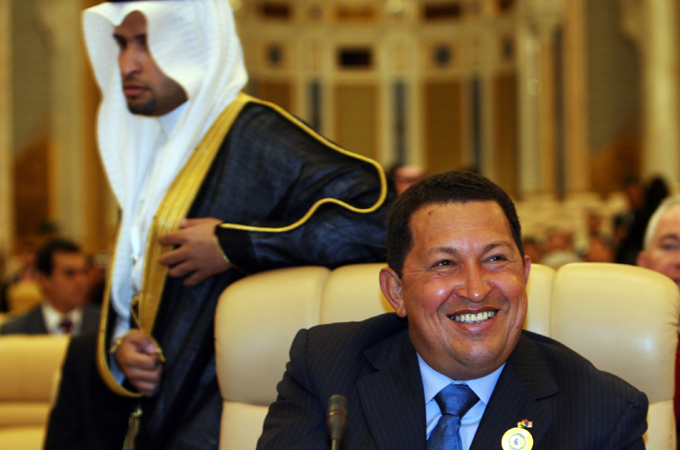
Venezuela's government, led
by president Hugo Chavez,
may control 85 per cent
of Latin America's crude reserves
Al Jazeera, "Latin
America holds one fifth of world's oil" - July 19, 2011
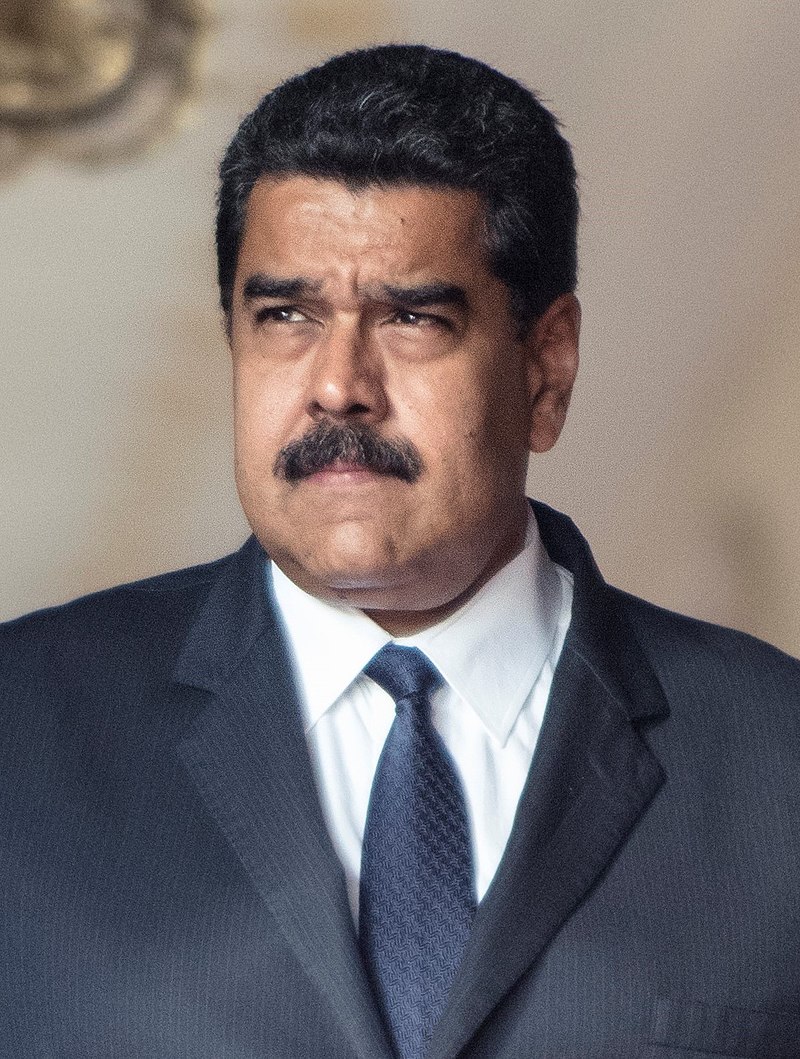
Brazil seeks to enter the realm of greater international influence as a member of BRICS
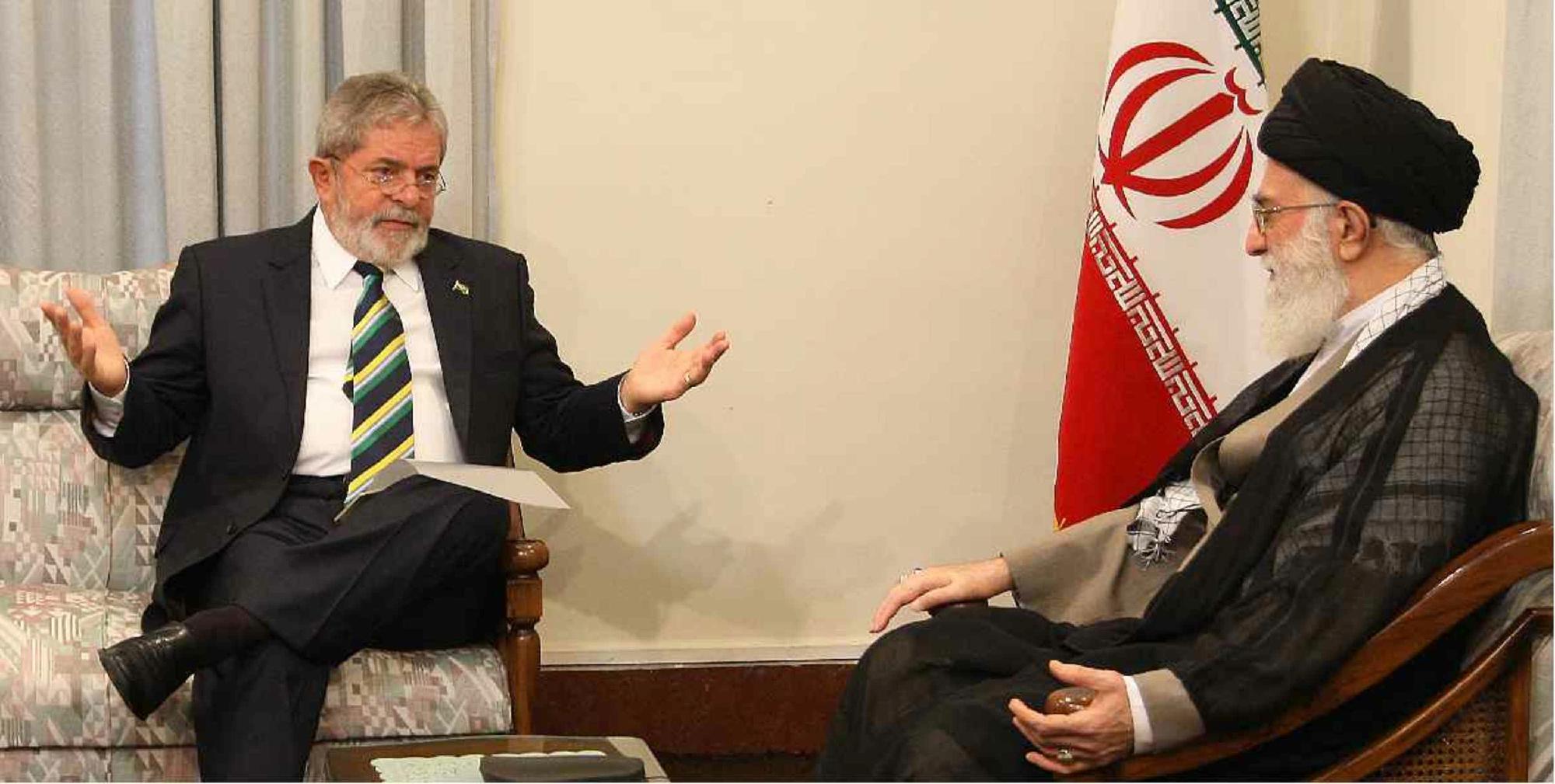
Brazilian President Luiz
Inácio Lula da Silva with Iran's Supreme Leader Ali Khamenei -
16
May 2010
Agência Brasil
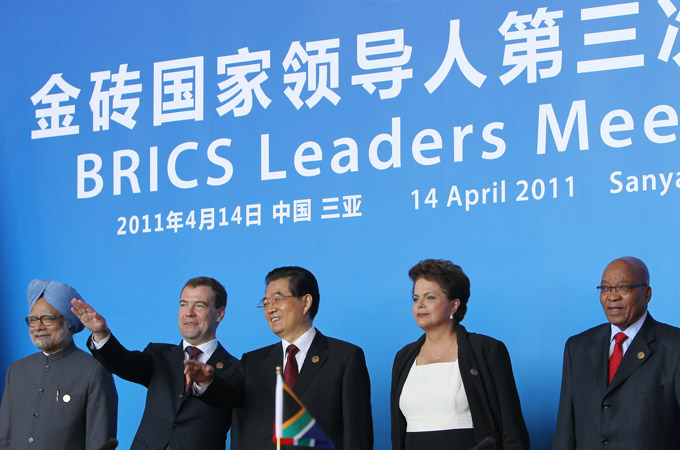
A financial meeting of the leaders of the "BRICS" nations - August 2011 - Brazil, Russia, India, China and South Africa
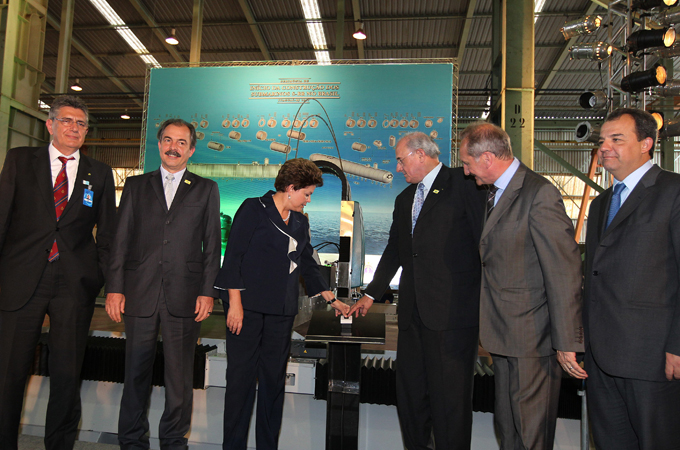
Brazilian President Dilma
Rousseff makes the symbolic first cut of a steel plate - marking the beginning of
submarine production - 16 July 2011
Al Jazeera, "Brazil's
new nuclear subs to defend oil wells" - July 23, 2011
THE CONTINUING DEVELOPMENT OF THE EUROPEAN UNION |
|
The Treaty of Nice (2001-2003)
In 2001, European Union member-states signed a treaty at Nice, to provide for changes in the EU's legal basis so as to be able to include newly-independent nations of the former Soviet bloc … and other countries as well seeking association with the EU. Agreement on the terms of this treaty did not come easily (reminiscent of the problems between America's larger and smaller states when they assembled to draw up a new constitution in 1787) … as France wanted equally-weighted voting in the Council ... and Germany, with a much larger population, felt that representation should vary according to the size of the member country – with its reunification Germany now being the largest of the EU members. The results were the compromise of a "double majority" – both a majority of the member states as well as a majority of the EU population to be represented in a "yes" vote on matters. Also troubles arose when a unanimous consent of all member states was necessary for the ratification of the Treaty … and Ireland, when the Treaty was put to a popular referendum, with a very low voter turnout, at first failed to approve the Treaty. Many of the Irish, who were of a mind to stay neutral in the world's various international contentions, were afraid of turning its foreign policy over to an international authority. After much debate on the matter, a year later a second referendum was held and the Irish finally approved the Treaty. In any case, this opened the door for the entry of new members into the EU … with Poland, Hungary, the Czech Republic, Slovakia, Slovenia, Estonia, Latvia, and Lithuania joining in 2004 – along with Cyprus and Malta. And then Bulgaria and Romania followed in 2007. Thus at this point, EU membership stood at 28 countries. Only Switzerland and Norway, plus Albania and several of the former Yugoslavian regions of the Balkans, found themselves out of this much-expanded European "West." 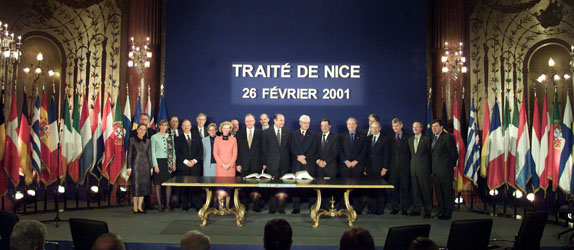 The Treaty of Lisbon (2007-2009)
In 2007, members of the European Union signed a treaty in Lisbon that made some significant developments in the legal character of the EU. Step by step, Europe had been moving toward an all-European government system that resembled the governments of most of the member states. However, an earlier effort in 2005 to create a stronger constitution had failed, when French and Dutch voters rejected constitutional revisions put before them for ratification. But the 2007 treaty was accepted – again only after two attempts at passage in Ireland with a "no" in 2008 and then finally a "yes" in 2009. The treaty provided for the continuance of the European Council - made up of the leaders (usually the prime ministers) of the various member countries, whose task has long been to give the EU its general direction and to make policy decisions for the union. The treaty likewise continued to assign the Council the duty of appointing and overseeing the European Commission – the "Cabinet" or committee that had the responsibility of managing the day to day operations of the EU … including its rather hefty bureaucracy. Where the Treaty of Lisbon beefed matters up was in making the European Parliament, whose members were directly elected by the citizens of the members states, something of a co-equal legislative branch alongside the Council – requiring the two bodies to work together in supporting or vetoing decisions of the European Commission, in determining the EU budget, and in shaping the EU's foreign policy … although the Council still carried greater weight than the Parliament in foreign policy matters. Likewise, the Treaty created the offices of President, to lead the Council, and a High Representative of the Union for Foreign Affairs, something like an EU Foreign Minister. |
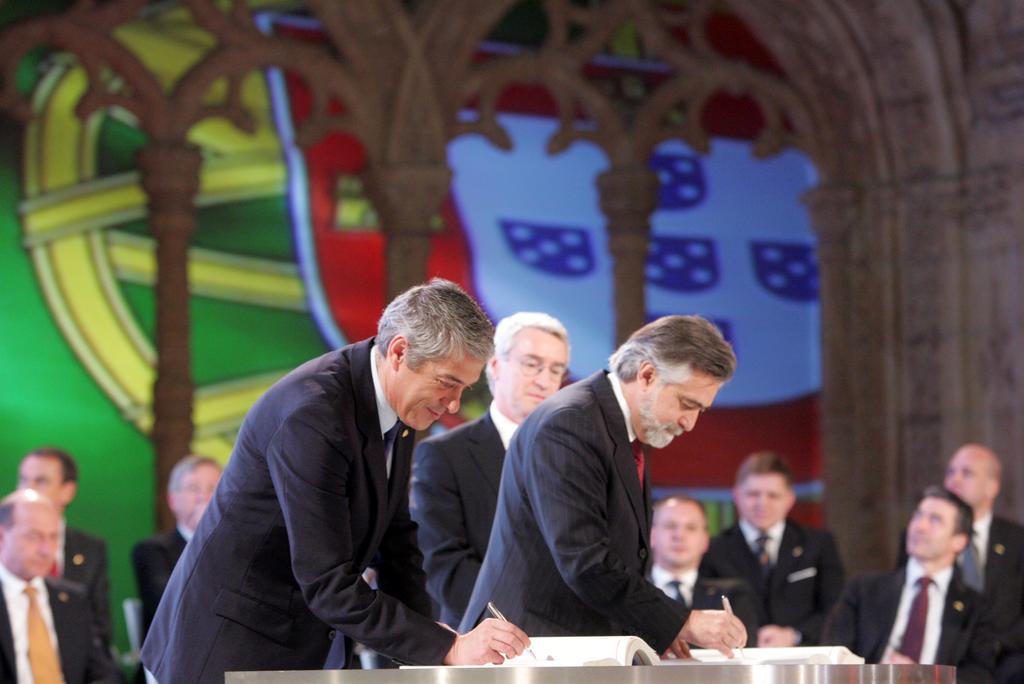
Portuguese Prime Minister José Sócrates and EU Council President Luís Amado signing the Treaty of Lisbon replacing the European Union with the European Community
BUT ... DEEP
CHANGES IN THE WEST'S ECONOMIC STRUCTURE |
|
The Western industrial switchover
from manufacturing to service industries What the highly technologically developed West is discovering is that its move from manufacturing to service industries does not really create the jobs necessary to keep a middle class society fully employed. The loss of manufacturing jobs to countries in the Third World where labor is much, much cheaper - starting in the late 1970s and increasing rapidly over the next several decades - has benefitted tremendously a smaller class of business professionals (a rising social elite) at the terrible expense of moderately skilled middle class industrial workers in the West. The changeover from manufacturing industry to service industry was however hailed a the startup of this switchover in the 1970s as a vast social-cultural improvement for everyone. People who lost manufacturing jobs could be retrained - and brought into the new world of service industry where the working environment was "cleaner" and physically less taxing. And so the nation got behind a shift in the American educational program - away from the traditional understanding that a high school education prepared anyone for a well-paying middle class job in the manufacturing world. Empahsis was placed on gaining 'higher education' (no longer just in the college "humanities" as it had previously been) in support of 'professional' and 'pre-professional' jobs in the human services world. It sounded like a marvellous idea at the time. But it would soon reveal some servious economic flaws that would hit the West hard by the year 2000. The sad economic results
A growing income gap between a dwindling numer of successful - and highly paid - service professionals and a declining Western middle class began to reveal itself dramatically in the first decade of the 21st century. Many Westerners that would have been part of the middle class under an industrial economy found themselves sinking into a condition of economic insecurity. They maintained middle class economic expectations only by going heavily in debt to purchase the visible features of the middle class life style. But a huge financial unreality began to develop behind this development - both for the borrowers, and for the banks that accommodated them in this program of borrowing. At the same time, growing batallions of welfare familes and youth gangs found themserlves idle in the formerly manufacturing, now service, urban economy, unable to contribute anything to the national economy. In fact they become a huge financial - and social - burden as they watched their lives slip away. Unanticipated causes
The fundamental problem here is that service industries do not have the multiplier effect that manufacturing industries do: a service-industry type job does not automatically call into existence other supporting jobs the way manufacturing does. At the same time, expensive training for service industries does not guarantee the student a good-paying job at the completion of the training period. Jobs in the service industry do not grow in number in response to economic stimuli the way manufacturing jobs do - and the increase in the number of trained service workers who are adapting to the new economic circumstances are forced however to take jobs at the very low-paying end of the service industry (working in retail stores, fast food restaurants, etc.) These jobs do not come close to supporting a traditional middle class lifestyle. This is the main reason for the way the level of growth of national productivity has slowed way down in the West - at the same time that a number of Third World economies are exploding. What can be done about this situation?
Industrial workers in the West have outpriced themselves in comparison to the cost of similarly skilled workers in the Third World. Labor unions fought hard to see big economic gains for their industrial workers - only then to see industrial labor go "offshore" - forcing layoffs of industrial workers in the West. Some workers have taken up service industries - but a the very low-paying end of the industry. Nothing of course can be done about the cheaper labor costs in Third World countries. But focusing on high-tech manufacturing still gives the West some place in the manufacturing world. A better option can be seen in the American South where labor unions have had only a very slight impact. Even Japanese and German manufacturers have located their industries there where labor is abundant, well trained, and close to the market where the finished product (notably automobilies) are sold. Wages are fair, affording the workers a middle class life, and supportive of a whole community's economy. The dollar, priding itself as the international "hard currency" of choice, is not very competitive because of this role it has chosen for itself. It is way overpriced. This makes foreign manufactured goods very cheap in the American market place - stimularing the manufacturing industries of other countries (notably in Asia). But it kills any chance for American manufactures to be competitive internationally, or even domestically. It also leads to governmental monetary strategies that are of very dubious help to a struggling American economy. The dollar needs to be freed up. But to do so would be to unnerve the international financial world grown used to the dollar foundation that holds the whole thing together. To untether the dollar would send shock waves through the global economy (as we have recently seen). But the dollar cannot continue to play this role at the same time that America undertakes economic renewal.
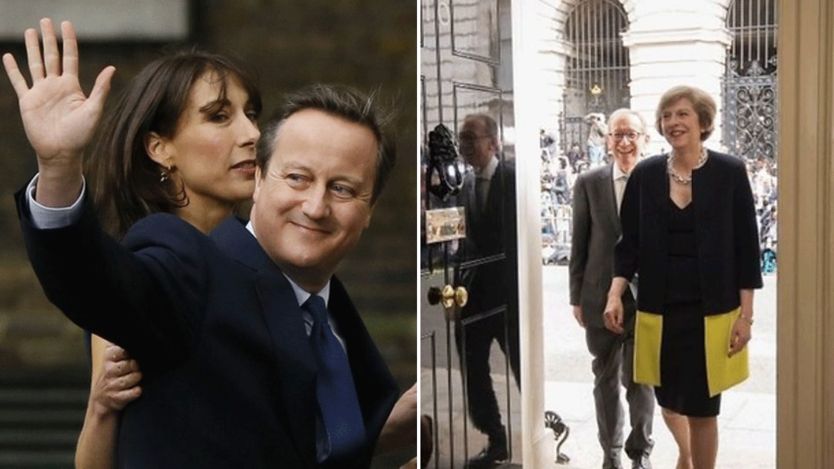  Go on to the next section: Trump and the World
 |



